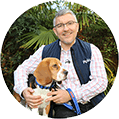Sometimes our dogs can have the occasional toileting accident, but what if this becomes a habit? Find out more about some of the most common dog toilet problems and how you can prevent them.
From accidents in the night to peeing in someone else’s house, or even eating poop out of the cat’s litter tray, our dogs can have a few toileting habits that might cause us confusion. There can be many different reasons for this behaviour, including medical issues, separation anxiety and wanting to mark their territory.
Why does my dog pee in other people’s houses?
Urine marking is when dogs, usually intact males, leave small amounts of pee to mark their territory. Your dog may have smelled other dogs who have visited the house before and want to cover the scent of those dogs. Having your dog neutered can help reduce this issue, but revisiting training can also help, especially if your dog’s general house-training isn’t that well established yet. It can be difficult to distinguish urine marking that’s due to socially or sexually motivated issues from other medical conditions, so it’s always best for a vet to carry out a complete checkup.
Why is my dog suddenly incontinent?
If your dog is suddenly peeing around the house more often, you should speak to your vet. This behaviour can be caused by urinary incontinence and is different to inappropriate urination like urine marking. Dog urinary incontinence can be caused by a range of medical issues and isn’t behaviour related. Remember that your dog isn’t choosing to pee in the house; they simply can’t control their bladder. Medical issues like urinary tract infections and urinary stones can cause incontinence. Even your dog’s breed can impact their ability to control their bladder. Also, some female dogs experience what’s known as ‘spay incontinence’ after they’ve been spayed. In short, there are lots of different factors to consider.
Why does my dog pee in the house when I’m out?
Usually if your dog pees in the house while you’re away, it’s either down to separation anxiety or simply because they’ve been left at home alone for too long and couldn’t hold their bladder any longer. Never tell your dog off when they have an accident, but spend time praising them when they get it right instead. If you’ve been having problems toilet training your dog, then revisit their training or speak to a dog behaviourist for some expert advice.
If you need to clean up pee spots, make sure to use either biological washing powder, white vinegar, or an enzymatic cleaner designed specifically for pets. Any of these will neutralise the enzymes within the pee that, if left, can encourage your dog to keep peeing in the same place again. Steer clear of cleaning products that contain alcohol, bleach or hydrogen peroxide since these can be dangerous for your pet.
Why does my dog poo in the house at night?
Once toilet trained, most dogs are very good at waiting to go to the toilet until you let them out each morning. If your puppy has only just been toilet trained and has started to poop in the night, it might be that they can’t hold their bowels all night, or they need some reinforcements to their training.
Adult dogs may have become frightened by fireworks, have eaten something that upset their digestive system, or even not wanted to poop outside in the rain when you let them out last night! Bowel incontinence can happen in older dogs, and it could also be a sign of joint discomfort and not wanting to move too far. When it comes to their toilet habits, most dogs will follow a set routine so if your dog is suddenly pooping at night, it’s best to speak to your vet to see if there’s an underlying reason.
Why does my dog eat poop?
This behaviour might seem a bit disgusting — but it’s perfectly normal in dogs. Known as coprophagia, poop eating is most often seen in mother dogs with a litter of puppies. Other dogs may also eat either their own poop, or that of another animal. While poop eating is usually harmless, it’s best to ask your vet to check your dog’s overall health, and make sure their parasite medication is up to date. Poop eating can be caused by stress, boredom, or loneliness so it’s worth discussing these possibilities with your vet as well.
Why does my dog roll in poop?
Sometimes, our dogs can’t resist rolling in something stinky. This is usually poop from other animals like cows or foxes. It’s not clear why our dogs do this, but it could be as a way of camouflaging their own scent, communicating with other dogs, or scent marking. If your dog loves rolling in poop, you can try to limit their opportunity to do so by keeping them on the lead, or making sure their recall training is up to date so you can call them back if they spot a tempting pile of poop.
Accidents do happen, and if your dog does the occasional pee or poop somewhere you’re not expecting it’s not always a cause for alarm. But if this is happening regularly, or you’re at all concerned about your dog’s health, it’s always best to speak to your vet for advice.
